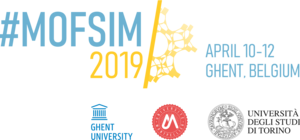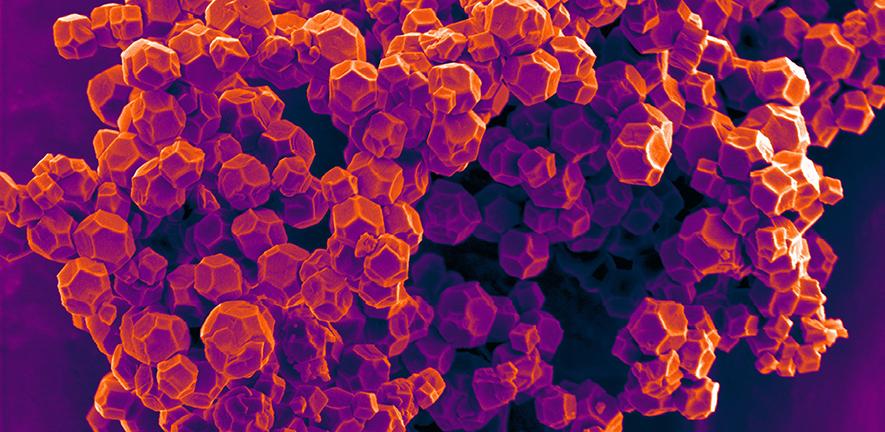Vacancies in the field of operando modeling of zeolite catalyzed reactions
The research group of Prof. Van Speybroeck, which is embedded within the multidisciplinary Center for Molecular Modeling, is looking for highly motivated and creative PhD candidates in the field of operando modeling of zeolite catalyzed reactions for industrially important processes. We are actively working on processes that will facilitate the transition from an oil based economy towards more sustainable chemical processes. Within this context we have a proven track record on the methanol to olefin process and alkene cracking and we are furthermore developing activities in the CO2 to hydrocarbons process and biomass conversion. To maintain our excellence level in these areas we are looking for new motivated researchers to join our team. All the projects are performed within an active network of prominent experimental partners. For all these chemical processes we aim to describe reactions and intermediates at operating conditions, thus at realistic working temperatures, loadings within the pores… To pursue these goals, we have developed a branch of first principle molecular dynamics methods that is recognized at the international level. You will be embedded within the Catalysis @CMM hub which is internationally recognized.
Go to: PhD positions | Postdoctoral positions | How to apply?
Vacant projects for PhD positions
1 PhD position in the topic:
'Zeolite-induced shape-selectivity for waste-free, highly regioselective catalytic arylation or alkenylation of aromatic C-H bonds'
Main host institution: Center for Molecular Modeling (CMM), UGent with Prof. Van Speybroeck. This is a position within the framework of a joint project with Prof. Dirk De Vos (KULeuven)
Within this project metal containing zeolites are investigated for the C-H activation of aromatic molecules in a shape-selective way. There is a strong pressure on the chemical sector to develop low waste routes, with a minimum number of process steps, for the production of high added value chemicals. Especially pharmaceutical production asks for products that are free of metal traces or residues of reactants, and isomerically pure. This provides a strong driver to invent new routes that activate C-H bonds, e.g. in aromatic molecules. However, aromatics often contain several C-H bonds, among which most catalysts do not discriminate. Consequently, most homogeneous catalysts (e.g. Pd) produce undesirable mixtures of isomeric product molecules. Together with our experimental partner Prof. Dirk De Vos (KULeuven) we have discovered new shape-selective zeolite catalyzed routes for C-H activation. Within this PhD topic, it is the intention to mechanistically explore from molecular level the reaction mechanism of the arylation reactions in various zeolites at operating conditions. To this end, we use a plethora of first principle molecular dynamics techniques. Our approach is unique as we simulate reactions at operating conditions thus fully accounting for the zeolite environment and dynamics and real process temperature conditions. We have a long standing collaboration with the De Vos group, which has already led to numerous high impact publications such as in JACS, Angewandte Chemie – International Edition,… The candidate will have the opportunity to actively participate in this successful partnership.
1 PhD position in the topic:
'Towards molecular control of electrophilic aromatic substitution reactions in homogeneous and heterogeneous environments through a combined ab initio molecular dynamics and conceptual density functional theory approach.'
Main host institution: Center for molecular Modeling (CMM), UGent with Prof. Van Speybroeck This is a position within the framework of a joint project with Prof. Frank De Proft (VUB- ALGC) and Prof. Bert Weckhuysen (Utrecht University)
The electrophilic aromatic substitution (SEAr) is a cornerstone reaction discovered by Friedel and Crafts in the 19th century. Despite its industrial importance for ethylbenzene production, the reaction mechanism is still debated. The proposed mechanistic pathway, relying on the formation of arenium ion intermediates, was recently challenged on experimental and theoretical grounds. The formation of the commonly assumed Wheland intermediate may critically depend on the reaction medium and process conditions. Herein, we will theoretically study SEAr intermediates in solvent and zeolite environments. Reactivity will be studied by an ingenious coupling of conceptual reactivity descriptors and construction of free energy profiles by means of advanced molecular dynamics methods. Such techniques allow following chemical transformations in-situ, thus closely mimicking experimental conditions. Complementary qualitative insights into reactivity will be obtained with a conceptual density functional theory approach. The combined approach will yield insights into governing SEAr reaction mechanisms and its dependency on the molecular environment and operating conditions. The theoretical work will be performed in close synergy with the group of Prof. Bert Weckhuysen, who recently spectroscopically identified the Wheland intermediate for benzene ethylation in zeolites. The outcome of the project will provide a general approach to unravel chemical reactivity in complex reaction environments.
Vacant positions for postdoctoral researchers
Postdoc positions in the field
'Operando modeling of zeolite catalyzed reactions for industrially important processes'
Postdoc positions are typically opened for one year but are potentially extendable. We especially welcome candidates with a strong track record who might become eligible to apply for Marie Curie postdoctoral fellowships or prestigious postdoctoral fellowships at our national funding agency (FWO).
Main host institution: Center for Molecular Modeling (CMM), UGent with Prof. Van Speybroeck
Topics eligible for postdoctoral positions:
The last decades, major efforts have been performed to induce the transformation from an oil based economy to the usage of alternative feedstocks such as natural gas and biomass to produce chemicals. This effort goes hand in hand with the development of cleaner processes to meet the mounting environmental concerns. The design of innovative and efficient catalysts for hydrocarbon conversion is of utmost importance to facilitate the transition to more sustainable chemical processes. We are actively looking for postdocs with a strong CV in the topic of the zeolite catalyzed reactions to reinforce our research in the on methanol-to-olefins and CO2 to hydrocarbons processes.
About the Center for Molecular Modeling (CMM)
The Center for Molecular Modeling (CMM) is a multidisciplinary research center of about 40 researchers from the Faculties of Sciences and Engineering and Architecture of Ghent University. The CMM, which is led by Prof. V. Van Speybroeck, is composed of an interdisciplinary research team which consists of chemists, chemical engineers, physicists, engineers in physics, chemical technology and bio-engineers. The Center focuses on frontier research in six major areas: nanoporous materials, modeling of solid-state physics, spectroscopy, many-particle physics, model development and bio- and organic chemistry.
The research team of Prof. V. Van Speybroeck focuses on modeling complex transformations in nanoporous materials such as zeolites, metal-organic frameworks and covalent organic frameworks. Our aim is to obtain physical and chemical insight into chemical reactions in and phase transformations of these nanoporous materials at operating conditions. This research fits into a large-scale investment we have started since 2015 within the framework of an ERC Consolidator Grant to use first principle molecular dynamics methods within the field of catalysis and nanoporous materials. To this end, we employ a complementary set of modeling techniques, either based on first principle methods such as density functional theory or on first-principle derived force fields, in combination with advanced sampling methods to unravel the governing free energy profile of various complex transformations.
The research team consists of various junior and senior researchers with various backgrounds which enables us to give a proper intellectual environment for the conducted research. We stimulate interaction between researchers with various backgrounds to enable groundbreaking research at the interface of physics, chemistry and materials science. The research is conducted in close collaboration with excellent experimental groups to guide the design towards new and promising functional materials. The research group is internationally regarded to be at the forefront in its field.
Who are we looking for?
We are looking for highly motivated and creative PhD candidates who have :
- an excellent master’s degree or an international equivalent in the relevant fields of Chemistry, Chemical Engineering, Physics, Engineering Physics, Physical Chemistry or a related field.
- a strong interest in sustainable energy conversion;
- excellent research and scientific writing skills;
- perseverance and an independent, pro-active working style;
- the willingness to look beyond the borders of his or her own discipline and strong motivation to work in a multidisciplinary team;
- excellent collaboration and communication skills (written and verbally) in English.
What can we offer you?
The selected candidate(s) will have the ability to attend various international conferences and to include research stays abroad in the most prominent international research teams in this field within the framework of his/her PhD or postdoc. Selected postdoc candidates will get the ability to strengthen their CV within the context of a multidisciplinary team. We especially looking for candidates with a strong track record and excellent study results.
How to apply?
It is the intention to fill these positions as soon as possible. Students who will obtain their Master degree in June/July are also eligible. Fill in the application form (download below) and send the form together with all required documents to cmm.vacancies@ugent.be
| Attachment | Size |
|---|---|
| 99.17 KB |







